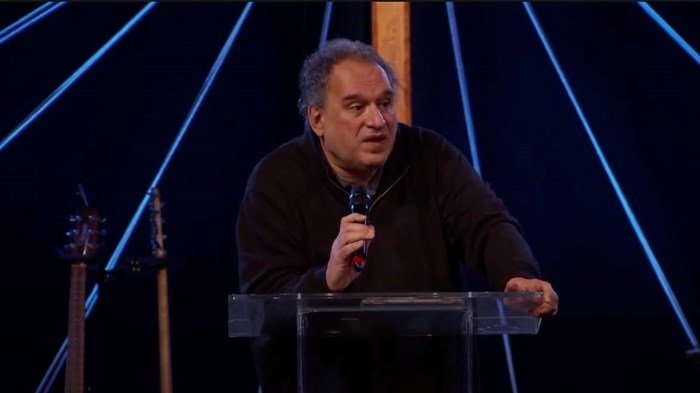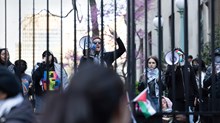
One of the most influential leaders in British evangelicalism used his spiritual authority to control people, exhibiting “coercive behavior” that led to inappropriate relationships, wrestling, and massages, the Church of England has concluded.
The church’s investigation into allegations of harmful behavior by Mike Pilavachi, the founder of the Soul Survivor youth festival and an ordained minister, was first announced in April.
Although the details were never made public either by Soul Survivor or the Church of England, in recent months national newspapers have published accounts by men who had served as staff members and interns at Soul Survivor. The accounts include allegations that Pilavachi massaged, straddled, and wrestled with the men and others as teens.
On Wednesday, the Church of England media team said that the investigation, carried out by the National Safeguarding Team, had concluded that these concerns were “substantiated” and spanned four decades: from Pilavachi’s time as a youth leader at St. Andrew’s Church in Chorleywood to the present day.
“The overall substantiated concerns are described as an abuse of power relating to his ministry, and spiritual abuse,” the statement read. “It was concluded that he used his spiritual authority to control people and that his coercive and controlling behaviour led to inappropriate relationships, the physical wrestling of youths and massaging of young male interns.”
The statement quoted the definition of spiritual abuse that has been adopted by the House of Bishops (the senior leadership of the Church of England): “a form of emotional and psychological abuse characterised by a systematic pattern of coercive and controlling behaviour in a religious context.’”
The extent of Pilavachi’s influence has meant that the allegations have had a significant impact on British evangelicals. It is now 30 years since Pilavachi founded both the Soul Survivor festival—an annual gathering attended by up to 30,000 young people and youth leaders—and the Soul Survivor church in Watford, a town north of London. Many people have taken to the internet to process either their personal experiences of Soul Survivor or their feelings about the revelations.
Gavin Calver, the CEO of the UK’s Evangelical Alliance, shared a statement on X (formerly Twitter), offering prayers for all affected by Pilavachi’s abuse.
“The longevity and the consistency of the accounts is heart-breaking,” he said, “and like many of you, I’m left with uncomfortable questions as I wrestle through the conflicting realities of the lives transformed by Jesus through Soul Survivor, paired simultaneously with the long-term effects of trauma and pain caused by abuse in the same space.”
Among those who have come forward with allegations is David Gate, a former worship leader at Soul Survivor. In May, he told the Sunday Times that Pilavachi had singled him out as a 16-year-old and told him he was “going to do amazing things for God.”
Wrestling, he said, “was a sign that he liked you—you were one of ‘Mike’s boys’ … Looking back, it must have appeared strange, a 45-year-old, well-built man wrestling on the floor with a 16-year-old boy.”
Pilavachi had “the power to break your career,” he said. “The only doors that would open for you were the ones that he opened for you to go through. For a teenager, it was emotionally devastating.” Like others, he described how Pilavachi related to him in a cycle of praise and attention followed by inattention and indifference.
The conclusion of the investigation isn’t the end of the process for Pilavachi. The National Safeguarding Team is also bringing a complaint against him under the Clergy Discipline Measure (CDM)—the means by which the Church of England handles allegations of serious misconduct.
Pilavachi already resigned as senior pastor of Soul Survivor in July, seeking forgiveness “from any whom I have hurt during the course of my ministry,” and returned his license to the Bishop of St. Albans, meaning that he cannot currently minister in the Church of England.
The most severe sanction that can be imposed by the CDM is prohibition for life from exercising ministry. The Church of England has said that it is “committed to ensuring that relevant safeguarding information is passed on if he were to minister elsewhere both in this country and abroad.” To date, Pilavachi has enjoyed an international ministry, traveling the world to preach at evangelical gatherings.
On Wednesday, Soul Survivor Watford announced that it had commissioned a senior litigator, Fiona Scolding, to lead a “full and independent review” of what had occurred. Some have claimed that top leaders at the church were aware of concerns about Pilavachi as early as 2004.
Soul Survivor Watford confirmed that the church’s senior pastor, Andy Croft, remained suspended. But the suspension of assistant pastor Ali Martin had been lifted, as concerns raised about her had not been substantiated. Both pastors were suspended in June in relation to “concerns over the handling of allegations.”
In its statement, the church said:
There has been a systematic pattern of coercive and controlling behaviour. We are saddened that these behaviours happened in a context that should have provided safety and spiritual support.
We are committed to learning lessons from what has happened and to put in place further practices and procedures that will seek to ensure this kind of behaviour does not happen in the future.
In recent years, spiritual abuse has received more attention in the Church of England, drawing on research by experts including Lisa Oakley, a psychologist who is currently professor of safeguarding and knowledge exchange at the University of Chester.
In 2017, she worked with Justin Humphreys, chief executive of the safeguarding charity Thirtyone:eight, on an online survey seeking to measure the prevalence of spiritual abuse: 1,002 of the 1,591 Christians who replied said that they had personal experience of it.
In 2018, a former vicar in Oxfordshire, Timothy Davis, was convicted by a church tribunal of spiritual abuse against a teenage boy. It was thought to be the first judgment of its kind. Over a period of 18 months, Davis held private Bible study sessions in the victim’s bedroom, putting the victim under what was judged as “unacceptable pressure.”
Evangelicals are starting to take preventative action, although some have raised concerns about the term spiritual abuse and its definition. Next year, an evangelical umbrella organization, Affinity, is due to publish a resource book for churches, Challenging Leaders: Preventing and Investigating Allegations of Pastoral Malpractice.
In the meantime, Calver wrote that these stories of abuses of power are coming up too often and “the evangelical church in the UK must do better.”
“As painful as it is, we must not resist the work of God’s Spirit to bring to light that which has been hidden in the shadows,” he said. “Environments, cultures and structures that allow, and even encourage, abuse to take place must be acknowledged and eradicated.”

Support Our Work
Subscribe to CT for less than $4.25/month


















